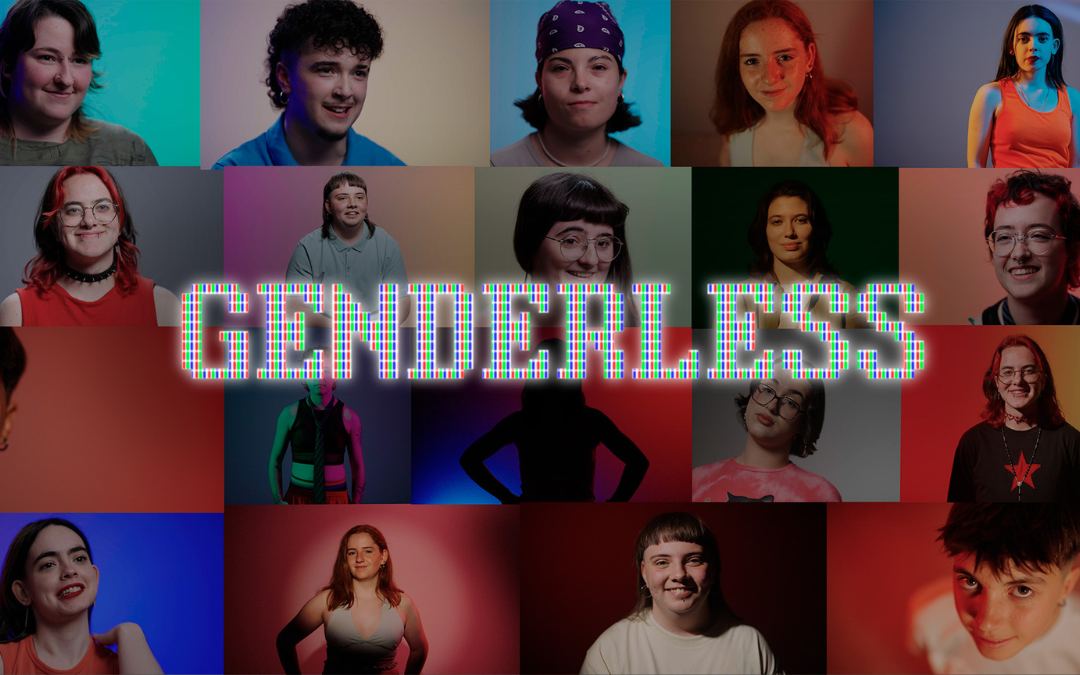- Produced by RTVE, EITB and Shine Iberia, this two-part documentary series shows that gender is not a binary issue (male/female).
- Premiere on ETB2 and eitb.eus this Thursday 26 June at 22:00 and on RTVE Play and La 2 this Saturday 28 June at 23:00.
‘Genderless’, the new documentary series on diversity and tolerance produced by RTVE, EITB and Shine Iberia, is coming to television. The first episode of this new production can be seen from Thursday 26 June at 22:00 on ETB2 and eitb.eus. RTVE Play and La 2 will premiere it on Saturday 28 June at 23:00.
Non-binary, cis, demisexual, intersex, gender fluid, trans… Society is evolving and so is gender and sexual diversity.’Genderless’ is a two-part documentary series about diversity and tolerance, which shows that gender is not a binary issue, that not everything is divided between being male or female, masculine or feminine. So what is non-binary gender? Not identifying with the gender assigned at birth based on genitalia, and not recognising oneself as either male or female. But to understand this, one must first assume that sex and gender are not equivalent and that the free assignment of gender identity raises complex, even controversial, issues that have real effects on our society. Everything has a B-side, including gender identity. When a person discovers that he or she feels neither male nor female, questions come to mind: Who am I? Is there something wrong with me? Why does my body make me feel rejected?
‘Genderless’ resolves all the doubts related to being non-binary and gives a voice to those who suffer or have suffered from gender dysphoria, who at some point have felt rejection towards their body or towards the gender they were assigned at birth and who do not fit in with the socially established. Because being non-binary implies a hard road of misunderstanding, struggle, suffering and, sometimes, rejection. Moreover, diversity is not only about gender, but also about sexual orientation. Although homosexuality and bisexuality are socially accepted, there are more options that still need to be learned and respected.
Unique and sincere testimonies
Diverse young people will tell in first person how they live their gender identity, the challenges they face daily, the solutions they find along the way and the support they receive from their families. Their parents will also reveal the process of acceptance they undertake to understand them, admit them and overcome the ‘grief’ that some of them suffer. Together they will share their concerns, their efforts to understand their feelings, their doubts about hormones and surgeries, and even the rejection that parents can sometimes feel towards their own offspring. While the adult generations struggle with labels, young people seek to give a name to the reality they experience, because ‘what you don’t name, doesn’t exist’. A way of defining themselves and ‘seeing that they are not alone’. In short, for the group, it is something that ‘saves lives’, as they also face rejection and homophobia, in some cases ending in suicide.
Psychologists, sexologists, activists, endocrinologists and a plastic surgeon specialising in gender reassignment surgery will shed light in “Genderless” on the most controversial aspects of this issue, as well as explaining how gender identity is formed and evolves over the years. While some experts consider this phenomenon to be a social advance, others see it as a fad and focus their attention on young people’s quest to be different, to have a body that reflects a personal, unique and unrepeatable identity. It will also address the serious consequences of leaving in the hands of adolescents and children, highly influential people, the making of such transcendental, and even irreversible in some cases, decisions about their own bodies. Consequences such as, for example, hormone abuse, the use of birth control pills in adolescence and undergoing surgery. For many people, it is crucial to understand that gender transition does not involve genital surgery. Many transgender people admit to undergoing vaginoplasty or phalloplasty because of social pressure.
There are those who make the decision out of conviction or out of fear and fear of rejection. However, there are people who live in harmony with the body that nature gave them. The documentary series exposes realities and concepts that are still unknown to the general public. It invites us to reflect on the direction we are taking, whether or not we are moving towards a gender-free society, and whether we really live in a free, open and tolerant society. In this way, it makes us ask ourselves if we integrate the different, if we are willing to accept a non-binary son or daughter, if we respect the reproduction of trans people, if we educate in inclusion, if legislation accompanies these changes and if social networks help or harm. Homophobia and transphobia are a pending issue in our society and, among other issues, “Genderless” shows that there are still families who push their children towards conversion therapies, illegal practices to convince them that being different is an illness.
